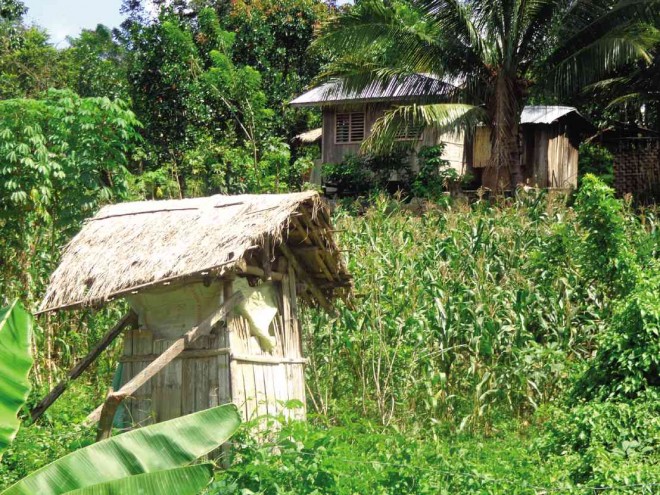More Filipinos have water, but many still lack toilets

TOILETS outside houses in the upland village of Kuya, South Upi, the only municipality in Maguindanao province and in the Autonomous Region in Muslim Mindanao that has achieved zero open defecation FRINSTON L. LIM
About 92 million Filipinos have access to improved water resources but at least 26 percent of the population still do not have clean and safe toilet facilities, according to the Department of Health (DOH).
Citing the 2015 Joint Monitoring Program of the World Health Organization (WHO) and the United Nations Children’s Fund (Unicef), the DOH yesterday reported that the Philippines had achieved its Millennium Development Goal on safe water and progressed toward meeting the sanitation target at 83 percent.
The report showed the country had managed to narrow the gap in access to safer sources of drinking water between the richest and poorest in rural areas, but greater disparity remained between the richest and poorest quintiles for sanitation.
Only 74 percent of the population have their own toilet facilities, while 26 percent, or roughly 26 million, still use unimproved facilities like buckets and open-pit latrines or do not have their own toilet facilities, of which seven million still defecate in the open—in fields, forests, bushes, bodies of water and other open spaces.
Health Secretary Janette Garin said the figures included victims of calamities on relocation or in evacuation centers.
To address the problem and continue to improve sanitation in Filipino households, particularly in the rural areas, the DOH yesterday launched the first National Sanitation Learning Exchange in partnership with the WHO and Unicef and the World Bank’s Water and Sanitation Program.
“Sanitation problems and challenges continue to pervade the country. Some of these problems are open defecation, lack of appropriate sanitation facilities and improper hygiene behaviors, which all have a direct or indirect impact on health,” said the DOH.
Poor sanitation often leads to contamination of water sources, contributing to incidences of deadly water-borne diseases such as diarrhea, cholera and typhoid fever and other illnesses like intestinal worm infection and malnutrition.
“We believe this advocacy can be strengthened through an aggressive campaign by the national government, local government units and with the support of our developmental partners, the private sector,” said Garin in a statement from Geneva.
She said the public and private sectors must “create a demand” for sanitation and strengthen the supply and market for sanitation products and services and empower institutions to make them more accountable in the delivery of water, sanitation and hygiene (Wash) services.
Six years ago, the DOH adopted the National Sustainable Sanitation Plan, aiming to reach 9.5 million Filipinos living in unsanitary conditions. Latest data from the 2012 Family Income and Expenditure Survey showed this number had been slashed by roughly three million.
Garin on Thursday said the DOH and its sanitation partners were seeing progress on the part of provincial and municipal governments in implementing sanitation programs in the last three years.
She noted that local governments passed ordinances, created technical working groups, crafted Wash plans and pioneered in innovative ways to address poor sanitation conditions in their areas.
The DOH also named yesterday the first 11 towns in the country to achieve “zero open defecation” status under the Zero Open Defecation Program.
These were Malungon, Sarangani; Buenavista, Quezon; President Roxas, North Cotabato; Arakan, North Cotabato; Agdangan, Quezon; Monreal, Masbate; Mercedes, Eastern Samar; and Mayorga, La Paz, Tunga and Pastrana towns in Leyte. TVJ














